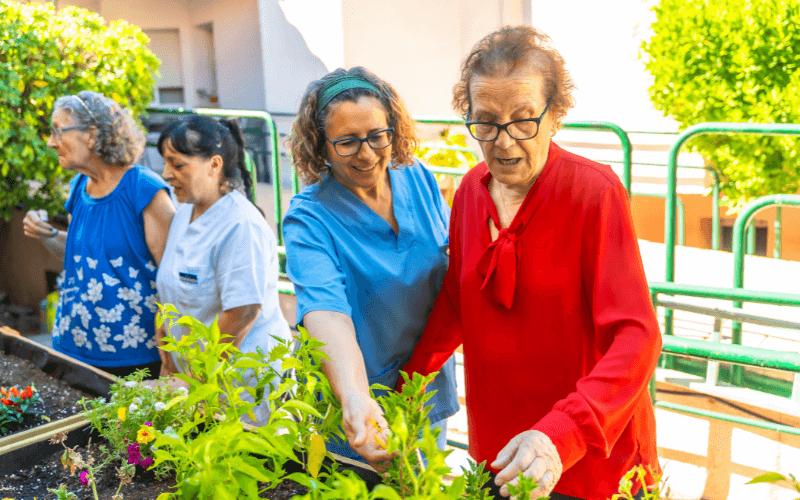The Role of Community Programs in Reducing Elderly Social Isolation
Social isolation among the elderly is a growing concern, affecting their mental, emotional, and physical well-being. In Australia, about 1 in 5 older adults (16%) are socially isolated, while around 10% of people over 65 in New Zealand report feeling lonely most of the time.
As individuals age, factors such as mobility limitations, loss of loved ones, and retirement can contribute to feelings of loneliness. Chronic health conditions such as cancer, diabetes, and Alzheimer's disease can further contribute to feelings of disconnection and isolation.
Fortunately, community programs play a crucial role in addressing this issue by fostering social connections, providing meaningful engagement, and enhancing the quality of life for seniors. Getting into these programs increases a sense of belonging and allows the elderly to create bonds with new people, reducing the risk of depression and anxiety.
In this blog:
How to Encourage Seniors to Participate in Community Programs
Improve Elderly Safety and Independence with Tunstall Healthcare
In this article, we explore how community programs help reduce elderly social isolation, the types of initiatives available, and the benefits they offer.
Understanding Elderly Social Isolation
Several factors contribute to social isolation among the elderly, including:
Loss of family and friends – The passing of a spouse or close friends can leave seniors without a strong support system.
Limited mobility – Physical challenges may prevent seniors from leaving their homes, making it difficult to engage with the community or visit friends.
Health issues – Chronic illnesses, hearing loss, or cognitive decline can make social interactions more challenging.
Retirement – Leaving the workforce can result in significant life transitions, reduced social interactions, and a low sense of purpose.
Limited transportation options – Many older adults rely on public transport, which may not always be accessible or convenient.
In some cases, older adults are geographically distant from family and loved ones, making visits costly and complicated for them.
Related reading: Helpful Tips for Easing into Retirement Life
The Impact of Social Isolation on Seniors
If ignored, social isolation can have serious and long-term effects on seniors, including:
Mental health challenges – Social isolation can increase the risk of depression, anxiety, and cognitive decline.
Physical health risks – Higher chances of heart disease, high blood pressure, obesity, and weakened immune systems.
Reduced life expectancy – Research indicates that prolonged loneliness may be associated with increased health risks.
Loss of independence – A lack of social engagement can lead to a decline in physical and cognitive functions, making independent living more difficult.
Collectively, these factors lead to reduced quality of life and increased healthcare needs. Worsening health conditions due to isolation can lead to increased healthcare needs for older adults.
Related reading: The Potential Risks of Social Isolation among Seniors and How to Avoid Them
How Community Programs Address Social Isolation
The good thing is that elderly social isolation can be addressed — community programs provide structured opportunities for seniors to connect, participate in activities, and access support networks. Below are some key ways in which they help combat social isolation.
1. Social Clubs and Activity Groups
Many communities offer clubs specifically designed for seniors, providing enjoyable, engaging, and educational activities, such as:
Book clubs – Encouraging intellectual engagement and discussions.
Gardening groups – Allowing seniors to enjoy nature while socialising.
Arts and crafts sessions – Providing a creative outlet and opportunities to interact with peers.
Walking groups – Promoting physical activity and companionship.
These activities help seniors stay active, maintain a sense of belonging, and support cognitive function.
2. Volunteer and Mentorship Programs
Volunteering provides seniors with a sense of purpose while allowing them to interact with people of all ages. Some popular initiatives include mentorships, community service projects, and animal therapy programs. They can use their experience and knowledge to provide value, guidance, and support where needed, such as in schools, hospitals, and animal shelters.
Related reading: Volunteering Opportunities for Seniors in Australia and New Zealand
3. Technology and Digital Literacy Programs
Community programmes often provide computer literacy classes and smartphone training, helping older adults learn to use email, video calls, and social media platforms. This makes it easy to stay in touch with their distant loved ones and friends. Plus, they can join virtual community groups, online meetings, and discussion forums to connect with peers. These initiatives help seniors stay engaged, even if they have mobility constraints.
Related reading: Top 10 Benefits of Technology for Seniors
4. Exercise and Wellness Programs
Physical activity for the elderly is vital for both health and social interaction. Community centres and programs provide yoga, meditation, stretching, group fitness, and dance classes. Participating in wellness programs not only enhances physical health but also helps seniors build relationships and maintain a shared exercise routine.
5. Senior Transportation Services
Limited public transport options and health-related driving restrictions can create barriers for many older adults. Luckily, community programs often include:
Shuttle services for seniors – Helping them attend events, medical appointments, and social gatherings.
Volunteer driver programs – Providing reliable and accessible transport options.
Public transport training – Educating seniors on how to navigate local transport systems.
Accessible transportation enables seniors to remain active in their communities and take short trips to favourite spots and activities like bird watching and parks.
6. Intergenerational Programs
Bridging the gap between generations fosters meaningful relationships through initiatives like school partnerships, where seniors share their stories, community gardening projects that unite different age groups, and cultural exchange programs that encourage interaction through music, art, and storytelling. These programs promote mutual understanding and social bonding.
7. Support Groups and Counselling Services
Seniors facing grief, illness, or loneliness can benefit from peer support groups, mental health counselling, and bereavement programs. They can get safe spaces to share their experiences and get professional guidance for coping with grief and loneliness. Such groups and services provide emotional support, which plays a key role in reducing feelings of isolation.
Benefits of Community Programs for Seniors
Participating in community programs offers numerous advantages, including:
Enhanced mental well-being – Regular social interaction can reduce stress, loneliness, anxiety, and depression.
Improved physical health – Staying active helps maintain mobility and prevent chronic illnesses, reducing medical needs.
Greater independence – Community engagement encourages seniors to remain self-sufficient and live normal lives.
Strengthened support networks – Building friendships and connections provides a safety net in times of need.
Increased happiness and life satisfaction – Engaging in fulfilling activities leads to a more positive outlook on life and allows them to find a purpose.
Beyond these benefits, community programs support life transitions, especially after retirement or moving to a new location. It becomes easy to adjust to new conditions and lead an exciting life.
How to Encourage Seniors to Participate in Community Programs
Despite the benefits, some seniors may be hesitant to join community programs. Here are ways to encourage participation:
Personalised recommendations – Help them find activities that align with their interests, such as gardening, bird watching, and book clubs
Gentle encouragement – Friends, family, or caregivers can introduce them to programs gradually, and be open to attending the programs with them.
Trial sessions – Many programs offer free trials to help seniors feel comfortable and determine whether they’re fit for them.
Peer testimonials – Hearing positive experiences from fellow seniors can boost confidence. Introduce them to friends who are already in such programs.
Transportation assistance – Providing rides or arranging transport ensures accessibility and encourages them to attend the programs.
Understandably, some older adults may feel hesitant about joining community programmes initially. Instead, focus on showing them the value and benefits of taking part in such programs.
Improve Elderly Safety and Independence with Tunstall Healthcare
Social isolation can significantly impact the well-being of seniors, but community programs provide valuable opportunities for connection, purpose, and engagement. From social clubs and wellness activities to volunteer work and digital literacy classes, these initiatives can reduce loneliness and improve the quality of life for older adults.
Encouraging participation in community programs can make a profound difference, fostering a sense of belonging and enhancing overall happiness for seniors in our communities. Apart from this, ensure they have assistive devices to support their safety and independence.
At Tunstall Healthcare, we provide personal alarms and fall detectors to ensure seniors are safe and independent whenever they’re alone. For instance, our Gem5 Watch helps seniors achieve peace of mind by ensuring immediate access to emergency services. It features precise GPS location tracking, allowing responders to find them quickly during emergencies.
Explore our products to find the right solution for yourself or your loved one.
Further reading: What You Need to Know About Independent Living for Seniors





